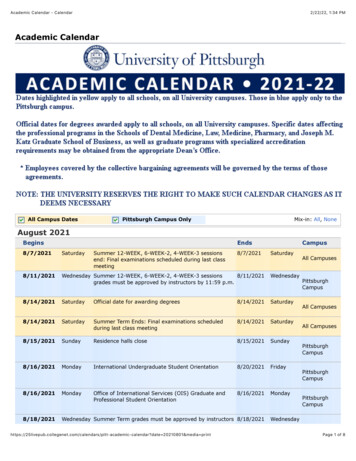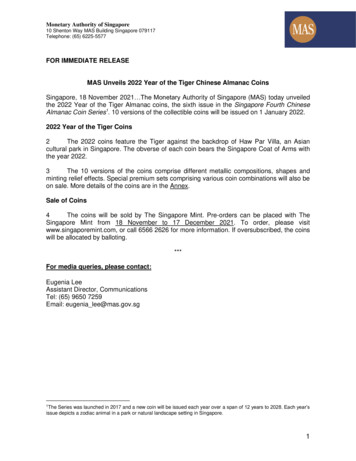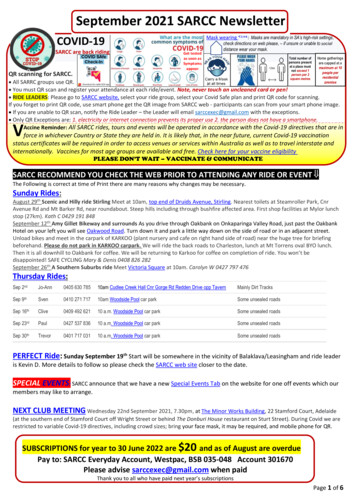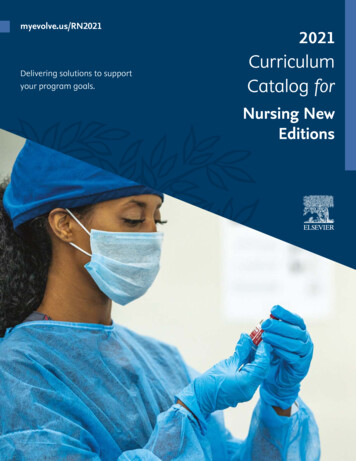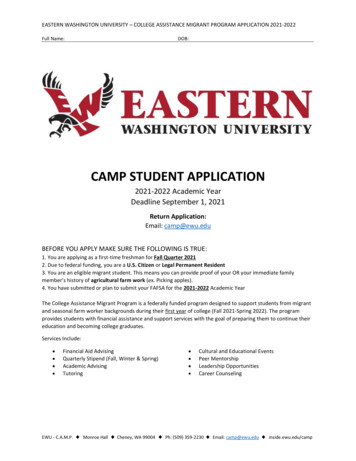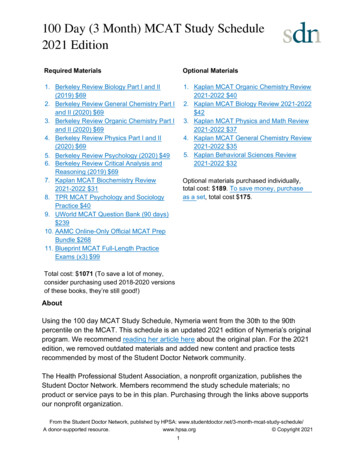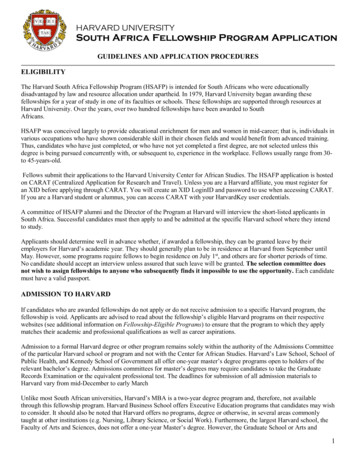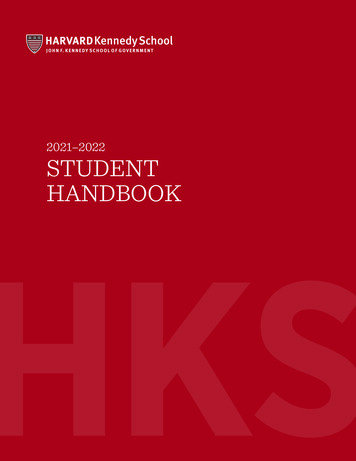
Transcription
H A R VA R D K E N N E D Y S C H O O L 2 0 2 1 – 2 0 2 2 S T U D E N T H A N D B O O K2021–2022STUDENTHANDBOOK1
H A R VA R D K E N N E D Y S C H O O L 2 0 2 1 – 2 0 2 2 S T U D E N T H A N D B O O KCONTENTSAcademicsThis section provides details about degree requirements,grades and credits, course registration, exams, and more.04081013162122Degree RequirementsGrades and CreditsSatisfactory Academic Progress PolicyRegistration PoliciesAttendance, Leave of Absence, and Degree CompletionExams and Final AssessmentsFamily Educational Rights and Privacy Act of 1974General Regulations and StandardsAll students are expected to abide by the regulations andstandards outlined in this section, including codes of conductand the HKS academic code.26272929304001Code of ConductAcademic CodeHKS Diversity StatementUniversity-Wide Statement of Rights and ResponsibilitiesOther Standards of Conduct in the HKS and Harvard CommunityDisciplinary Actions and Sanctions
H A R VA R D K E N N E D Y S C H O O L 2 0 2 1 – 2 0 2 2 S T U D E N T H A N D B O O KAdditional PoliciesBe informed of additional policies that govern activity at the Schooland university, from political activism to disability services.4444454545464647474848Coronavirus (COVID-19)University Access to Electronic InformationPolitical ActivismGDPR—European Union’s General Data Protection RegulationPetsMissing Persons PolicyStudent GiftsSafe TravelSelling Items at HKSDisability ServicesBulletin Boards and PostingFinancial InformationThe Office of Student Financial Services serves as a resourcefor exploring ways to finance one’s education.51Financial MattersDirectory of ResourcesUse this directory to find contact information for various officesat Harvard Kennedy School.56Important Phone NumbersNOTICE : Except where explicitly noted (e.g. grading systems), all expectations related to classroom and communitybehavior and to academic integrity that apply when students are on the HKS campus also apply when students are noton the HKS campus, including without limitation when they are engaged in remote, on-line HKS activities.At times, a review of academic, financial, and other considerations may lead to changes in policies, rules, andregulations. Harvard Kennedy School, therefore, reserves the right at any time to make changes, which may affect suchmatters as tuition and other fees, degrees and programs offered (including the modification or possible eliminationof degrees and programs), degree and other academic requirements, academic policies, rules pertaining to studentconduct and discipline, fields or areas of concentration, and other rules and regulations applicable to students.Please note: non-HKS students who are enrolled in HKS courses are expected to uphold the policies set forth in theHKS Student Handbook, including without limitation those related to academic integrity and the Code of Conduct. NonHKS students include, for example, Tuition Assistance Program (TAP) students and cross-registrants. HKS may take anyand all actions it deems necessary upon the discovery of a policy violation, including without limitation immediatelyrequiring the non-HKS student to withdraw from the course and notifying the non-HKS student’s home institution, ifapplicable. Additionally, HKS may preclude a non-HKS student who has previously violated HKS policy from registering inany future HKS course.02While every effort has been made to ensure that these pages are accurate and up to date, they may includetypographical or other errors. Changes will be made periodically. Do not assume that if something is not specificallyprohibited in the student handbook it may be done.
H A R VA R D K E N N E D Y S C H O O L 2 0 2 1 – 2 0 2 2 S T U D E N T H A N D B O O KAcademicsAcademics form the foundation of the Harvard KennedySchool experience. To help you make the most of youracademic experience, this section provides importantinformation about degree requirements for each program,how to decide upon and register for courses, the School’spolicies for grading, crediting and maintaining academicstandards, and what you can expect exams to be like.In addition, you’ll find information about the FamilyEducational Rights and Privacy Act (FERPA), whichoutlines how to access your educational records at HarvardKennedy School.00 33
Students are responsible for meeting all academic requirements of their degree program asdescribed below. Additionally, they must: Achieve a minimum grade point average of B. Complete a degree application. Have a zero term bill balance. If students leave the university with an amount dueon their student bill that is unpaid for 60 days or more, they may be subject tocollection activities and may not be permitted to participate in the Commencementceremonies or receive a diploma. The costs associated with collecting an unpaidaccount will be added to their outstanding debt and must be paid in full beforea degree will be granted.What are the specific requirements for each degree program?A complete course listing for each degree program’s requirements is available in the program’sKNet section.MASTER IN PUBLIC POLICY (MPP)Concurrent degree candidates with Harvard Medical School must complete aminimum of 48 credits, including the MPP core and PAE, and must be in residenceat HKS for two semesters. Joint degree candidates with Harvard Business School must complete at least 52 HKScredits, including the MPP core and PAE in addition to the Joint Degree Seminar inYears 1 and 2, and the Business-Government Integrative Course in Year 3. Joint degree candidates with Harvard Law School must complete at least48 credits, including the MPP core during their first year at HKS and 12 additionalcredits after the first year. They must also complete a third-year seminar and, in thefourth year, an intensive writing module and an integrated writing project. If students are exempted from one or more MPP core courses, they do not earncourse credit toward graduation for those exemptions; they are still required to earnthe minimum number of credits needed to obtain the degree by enrolling in theappropriate number of elective courses.DIRECTORY OF RESOURCES Concurrent degree candidates must complete a minimum of 48 credits, includingthe MPP core and PAE, and must be in residence at HKS for three semesters.FINANCIAL INFORMATION04 MPP candidates must successfully complete the core curriculum, the Policy Analysis Exercise(PAE), all requirements for their selected Policy Area of Concentration (PAC) or concentration,and other electives for a total of 72 credits. Students must take no fewer than 12 credits andno more than 24 credits each semester.ADDITIONAL POLICIESBe in residence for the required number of semesters for their program.Being “in residence” is defined as attending classes in the school’s designatedlearning modality and successfully completing at least 12 credits toward the degreeeach semester. GENERAL REGULATIONS AND STANDARDSDegree RequirementsACADEMICSH A R VA R D K E N N E D Y S C H O O L 2 0 2 1 – 2 0 2 2 S T U D E N T H A N D B O O K
ACADEMICSH A R VA R D K E N N E D Y S C H O O L 2 0 2 1 – 2 0 2 2 S T U D E N T H A N D B O O KMASTER IN PUBLIC ADMINISTRATION (MPA)1.2.3.Economics and Quantitative AnalysisManagement, Leadership, and Decision SciencesPublic Ethics and Political InstitutionsCourses to fulfill these distribution requirements may not be taken pass/fail and must becounted as part of the credits required for graduation. A reading and research (RAR) coursemay not fulfill a distribution requirement.Two-year MPA candidates must successfully complete at least 64 credits; earn a cumulativeGPA of B or better; fulfill the Policy Area of Concentration (PAC) requirement; and satisfy thedistribution requirements (with a B- or better in each). Two-year MPA students must take nofewer than 12 credits and no more than 24 each semester. DIRECTORY OF RESOURCES05FINANCIAL INFORMATIONSatisfactory completion of the MC/MPA Summer Program is a required component of thedegree because it provides foundational preparatory experience for incoming MC/MPAstudents. Full attendance and participation is required and expected, and students areallowed to miss up to two days without an impact to their final evaluation. At its conclusion,students will receive an assessment of either SAT or UNSAT on their transcript. If a studentdoes not achieve satisfactory completion of the Summer Program, they will receive an“UNSAT” on their enrollment record and will be withdrawn from the MC/MPA Program beforethe start of the fall semester. Students who are withdrawn from the MC/MPA program forfailure to receive a SAT grade for successful completion of the Summer Program will berequired to reapply for admission to the MC/MPA Program if they wish to participate in theprogram during a future year. Mid-Career MPA (MC/MPA) candidates must successfully complete at least 32 degree credits;earn a cumulative GPA of B or better; and satisfy the Distribution Requirements (with a Bor better in each). MC/MPA students must take no fewer than 12 degree credits and nomore than 24 each semester. In addition, MC/MPA students must successfully complete theMid-Career MPA Summer Program (and for MC/MPA Mason Fellows, the Mason Fall Launch) tocontinue into the academic year. MC/MPA Mason Fellows must also participate in the MasonSeminars during the academic year.ADDITIONAL POLICIESConcurrent MPA candidates must successfully complete at least 48 credits; earn a cumulativeGPA of B or better; satisfy the distribution requirements (with a B- or better in each); and bein residence at HKS for three semesters. Concurrent MPA students must take no fewer than12 credits and no more than 24 credits each semester. Two-year MPA students must also successfully complete at least 8 credits from one of thePolicy Areas of Concentration (PAC). Their PAC and distribution courses may not overlap.A Reading and Research (RAR) course may not be used to fulfill a PAC requirement.GENERAL REGULATIONS AND STANDARDSDistribution RequirementsAll MPA candidates must complete a minimum of 4 credit units from each of thefollowing areas:
ACADEMICSH A R VA R D K E N N E D Y S C H O O L 2 0 2 1 – 2 0 2 2 S T U D E N T H A N D B O O KMASTER IN PUBLIC ADMINISTRATION IN INTERNATIONAL DEVELOPMENT (MPA/ID) Joint or concurrent degree candidates must complete 52 credits, including theMPA/ID core and SYPA, and must be in residence at HKS for three semesters. If students are exempted from one or more MPA/ID core courses, they do not earncourse credit toward graduation for those exemptions; they are still required to earnthe minimum number of credits needed to obtain the degree by enrolling in theappropriate number of elective courses.DOCTORAL DEGREE PROGRAMSRequirements for joint and concurrent students vary by school and program. Students maypursue a joint or concurrent degree with HKS and only one other approved graduate program.They may not receive credit for a cross-registered course at a professional school in the samefield as their concurrent degree. Refer to the Combined Degree Guide for more information.Can courses be repeated?DIRECTORY OF RESOURCES06 Failed required courses must be retaken or replaced with an equivalent course to fulfill therequirement. Failed elective courses may be retaken. Courses passed successfully may notbe retaken.FINANCIAL INFORMATIONThe normal course load is 16 credits per semester or 32 credits per year, except for first-yearMPP or MPA/ID students. To enroll in fewer than 12 credits or more than 20 credits, studentsmust get permission from their program director before the add/drop deadline; additionaltuition usually will be charged for more than 24 credits. All January courses count as springcredits only, and students are limited to enrolling in a maximum of 4 credits within the Januarysession, including cross-registered courses. How many courses should students take each term?ADDITIONAL POLICIESJOINT AND CONCURRENT STUDENTS Read more about the PhD in Public Policy (PPOL) and PhD in Political Economy andGovernment (PEG) programs and their degree requirements. PPOL and PEG candidatesofficially register with and use the services of Harvard’s Graduate School of Arts and Sciences(GSAS) registrar after enrolling in the program. General information and guidelines areavailable from the director of the Doctoral Programs.GENERAL REGULATIONS AND STANDARDSMPA/ID candidates must successfully complete the core curriculum, the Second Year PolicyAnalysis (SYPA), and six electives for a total of 76 credits. Students must take no fewer than12 credits and no more than 24 credits each semester.
Are there courses that will not allow students to earn credit? Any undergraduate course other than languages. Any course taken prior to registration in an HKS degree program unless specialpermission is given at the time of admission. In cases where special permission isgranted, courses may be used as a substitute for or exemption from a requirement;however, they will not reduce the total number of credits needed to earn a degree. Transfer credits.Check the HKS Registrar’s Office on KNet for additional information regarding crossregistration and related restrictions.Can students earn HKS credit by taking a language course?Language courses may fulfill credits for graduation, depending on the degree program.MPPMPAMid-Career MPAMPA/ID4440All language courses for credit toward HKS graduation must be taken at the Faculty of Artsand Sciences (Harvard College) and approved by the appropriate program director at HKS.Language courses cannot be taken pass/fail unless the instructor indicates that all gradesawarded in the class will be either pass or fail. Language petitions are due on or before thelast ADD day of the semester.ADDITIONAL POLICIESMaximum Number of Credits Toward Graduation ProgramGENERAL REGULATIONS AND STANDARDSYes, there are limitations to courses that can be taken for credit. No credit is granted for:ACADEMICSH A R VA R D K E N N E D Y S C H O O L 2 0 2 1 – 2 0 2 2 S T U D E N T H A N D B O O K Joint degree candidates with Harvard Business School or Harvard Law School cannot earnlanguage credits toward their degree.Are there opportunities to complete reading and research (RAR) courses(i.e. independent study)?07DIRECTORY OF RESOURCESRARs may only be supervised by HKS faculty members who are either at the assistant orassociate level, or are full professors or lecturers. If students wish to work with Harvard facultymembers outside of HKS and earn credit for the course, they must cross-register for the RAR courses are opportunities for students to work independently on a topic of interest.Independent research courses are offered at the discretion of faculty members who mayaccept or decline students’ requests to have them supervise an RAR. Students may not becompensated for RAR research. The usual outcome of an RAR is a major research paper thatis 25-35 pages in length. Faculty members are expected to meet regularly with students todiscuss the work in progress and are responsible for overseeing the completion of theRAR contract.FINANCIAL INFORMATIONStudents also may take language courses for zero credit; however, grades for these courseswill be recorded on academic transcripts regardless of whether credit will be awarded towardgraduation. Regular add/drop deadlines apply.
RAR courses are graded SAT/UNSAT (satisfactory/unsatisfactory) only, and are taken fora full term for four credits. If a student earns an incomplete for an RAR, a faculty membermust oversee its completion. Students may enroll in only one RAR course per term and mustcomplete an RAR contract, which is a formal agreement between the student and the facultymember that outlines the work that must be accomplished to receive credit. All RAR contractsmust be submitted to the HKS Registrar’s Office by the ADD/DROP deadline.Grades and CreditsADDITIONAL POLICIESAn HKS grade below B- is a failing grade for any required course or distributionrequirement. Individual grades will not be released by the HKS Registrar’s Office to students.Unofficial transcripts may be viewed and printed through my.harvard.edu. HKS courses are graded A, A-, B , B, B-, C , C, C-, D, and E; a B average is required forgraduation. Courses with grades of E, UNS, INC, PI, ABS, or AWD will not count towardgraduation. A D is the lowest elective course grade for which students may receive credittoward graduation. Instructors teaching reading and research courses will award either SAT(satisfactory) or UNSAT (unsatisfactory) grades; letter grades will not be awarded for thesecourses and a SAT grade will not be included in GPA calculation. The Dean’s recommendedgrading distribution may be found on KNet.GENERAL REGULATIONS AND STANDARDSindependent study offering at the other school as well as submit a petition for HKS degreecredit to the HKS Registrar’s Office. Students are not permitted to complete HKS RARs withnon-HKS or non-Harvard faculty.ACADEMICSH A R VA R D K E N N E D Y S C H O O L 2 0 2 1 – 2 0 2 2 S T U D E N T H A N D B O O K INCOMPLETES DIRECTORY OF RESOURCES08FINANCIAL INFORMATIONIf students do not complete the required written assignments for a course and have instructorapproval in writing by the end of the semester’s reading period, they will be awarded anincomplete (INC) in lieu of a letter grade. Normally, an INC is regarded as a temporary gradewith a deadline to complete the coursework no later than the last day of the reading periodof the next semester. Students may petition one time to extend beyond the normal date.Students must file a Petition to Extend an Incomplete with the HKS Registrar’s Office; thepetition must be approved and signed by the instructor. The instructor is under no obligationto grant either an INC or any further extension. Once the work is complete and a letter gradeassigned, the instructor will submit a Grade Change Report form to the HKS Registrar’s Office;the grade will be changed on the student’s transcript. Grades or grade changes that aresubmitted after established deadlines are subject to approval by the Registrar. If the work hasnot been completed by the deadline or an extension has not been granted, the INC becomesa Permanent Incomplete (PI) and the course may not be counted toward graduation. Studentswho receive an INC for a cross-registered course should check with the host school’s Office ofthe Registrar for its policy on INC grades.
ACADEMICSH A R VA R D K E N N E D Y S C H O O L 2 0 2 1 – 2 0 2 2 S T U D E N T H A N D B O O KABSENT/FAILURE TO DROP (ABS)Failure to drop a course: Students who fail to submit a drop petition when dropping a coursewill receive an ABS grade. Students who receive an ABS or an E grade in two classes ordinarilywill be required to withdraw without the possibility of readmission to the School.PASS/FAILAudits for HKS courses do not appear on student records and are at the discretion of facultymembers. Audits at other schools will not appear on students’ academic records.ADDITIONAL POLICIESAUDITING Students may not take courses on a pass/fail basis unless the instructor indicates that allgrades in the course will be awarded as either pass or fail. Students who cross-register withother schools and are given the option of being graded on a pass/fail or letter grade systemmust select the letter grade option.GENERAL REGULATIONS AND STANDARDSAbsence from a final exam: To receive credit for an HKS course with a final examination,students must attend the exam unless they are excused prior to the time of the exam by theHKS Registrar’s Office for serious illness or family emergency; in this case, they also mustinform their program director or the assistant dean for student services and programs oftheir expected absence. If students are not excused and fail to sit for the exam, they willreceive an ABS (Absent) grade. This may be converted to a letter grade only if they providemedical documentation that they were suddenly seriously ill at the time of the exam. In thatcircumstance, or in the case of an excused absence, they will be required to take a make-upexam scheduled by the instructor.CROSS-REGISTERED COURSESStudents may not ask faculty members to review a final grade once it has been submitted tothe HKS Registrar’s Office unless there has been a mathematical miscalculation of the grade.In addition to a grade, how are credits awarded?Read more about grading and credits.09DIRECTORY OF RESOURCESOther schools at Harvard use different systems to award credit. Students must understandhow many HKS credits they will earn in a cross-registered course. Refer to HKS Registrar’sOffice KNet page for the table of credit equivalencies. Courses are awarded four credits for a term-length course and two credits for a module.There are also several courses labeled “Y;” typically, these courses are equivalent to fourcredits. They normally span the full academic year; meeting times vary. Students mustcomplete both terms of the course to earn course credit.FINANCIAL INFORMATIONGRADE CHANGES Students must meet the grade requirements of the school in which the course is offered. Seethe HKS Registrar’s Office KNet page for details on cross-registration.
Failed required course grades, a C or below, will be included as part of the assessment ofoverall grades and grade point average for SAP until the course is repeated or replaced withan equivalent course, and successfully completed.GENERAL REGULATIONS AND STANDARDSAn incomplete grade does not factor into GPA. Satisfactory Academic Progress PolicyFor the purpose of general academic progress, HKS evaluates students at the conclusionof each semester to determine whether satisfactory academic progress (SAP) is beingmaintained. Satisfactory maintenance of grades and pace is required to be considered makingsatisfactory academic progress.GPA GUIDELINESCumulative grade point averages will be calculated each semester. Refer to Grades and Creditsfor additional information regarding grades. Earn a B- or better in all required core courses, including Policy Area of Concentration(PAC)/Concentration requirements. Any grade below a B- in these courses is afailing grade. Earn a passing grade for the Policy Analysis Exercise (PAE) and seminar. Maintain a cumulative B average. Maintain a cumulative B average.Students who fail two different core courses or who fail the same core course a second timewill be withdrawn from the school without the possibility of readmission. Students can petitionfor a different outcome.Maintain a cumulative B average.Students who fail to successfully complete the Mid-Career MPA Summer Program and/or Mason Fall Launch, who fail two different distribution requirement courses, or who failthe same distribution requirement course a second time will be withdrawn from the schoolwithout the possibility of readmission. Students can petition for a different outcome.DIRECTORY OF RESOURCES One- or two-year Master in Public Administration (MPA) students must: Earn a B- or better in distribution requirements; those courses must be includedin the 32 or 64 credits required for the degree. Any grade below a B- in a requiredcourse is a failing grade.FINANCIAL INFORMATIONMaster in Public Administration/International Development (MPA/ID) students must: Earn a B- or better in all required courses, including the Second Year Policy Analysis(SYPA). Any grade below a B- in a required course is a failing grade. Students who fail two different core courses or who fail the same core course a second timewill be withdrawn from the school without the possibility of readmission. Students can petitionfor a different outcome.ADDITIONAL POLICIESMaster in Public Policy (MPP) students must:10ACADEMICSH A R VA R D K E N N E D Y S C H O O L 2 0 2 1 – 2 0 2 2 S T U D E N T H A N D B O O K
ACADEMICSH A R VA R D K E N N E D Y S C H O O L 2 0 2 1 – 2 0 2 2 S T U D E N T H A N D B O O KPACE GUIDELINES Successfully complete at least 65 percent of attempted credits. For example,an MPP student who completes 28 credits within 40 credits attempted at the endof the first year is considered to have maintained a successful pace of completion.Courses are not considered to have been completed satisfactorily if students:withdraw after the add/drop deadline; receive an incomplete grade; earn a C orbelow in a required course; or receive a failing grade (i.e., C or below in a requiredcourse; E for an elective course). Complete all degree requirements within a maximum of 200 percent of the requiredcredits for the program of study. For example, the MPP Program requires 72 credits.Students must complete those 72 credits satisfactorily by the time they have taken amaximum of 144 credits (72 x 200% 144).NOT MEETING SATISFACTORY ACADEMIC PROGRESS STANDARDSLess than a B average cumulative in the requisite number of courses for theirdegree program. C or below in any core course or distribution requirement course. Incomplete course grades with granted extensions of time past the normal due datein two or more courses.Federal regulations require that all courses taken—including courses that are taken morethan once—be considered when evaluating a student’s pace of completion and GPA whendetermining whether a student is maintaining satisfactory academic progress for financial aidpurposes. Therefore, it is possible that a student may be considered to be maintaining SAP bythe Registrar for general academic purposes but not for the purpose of determining continuedeligibility for financial assistance (including loans).11DIRECTORY OF RESOURCESIf students fail to regain SAP, they will become ineligible to receive assistance; they have theright to appeal. An appeal must detail the extenuating circumstances that resulted in the failureto maintain SAP and explain, in concrete terms, why those circumstances will not prevent themfrom maintaining satisfactory progress going forward. Appeals will be evaluated by a committeecomprised of faculty members and Degree Programs and Student Affairs administrators. SAP is evaluated at the end of each enrollment period. If students are receiving financialassistance and are determined to have failed to maintain SAP, they will receive a financialassistance warning letter to formally notify them of their status. In order to remain eligiblefor financial assistance beyond the next enrollment period, they must make the necessaryacademic improvements to regain satisfactory progress status.FINANCIAL INFORMATIONSATISFACTORY ACADEMIC PROGRESS (SAP) AND FINANCIAL ASSISTANCE Students typically will have until the end of the next semester exam period to remedy thissituation. Failure to remedy will result in required withdrawal from the program. Students canpetition for a different outcome.ADDITIONAL POLICIES Students who fail to maintain satisfactory academic progress will be placed on academicprobation at the end of any semester during which they receive:GENERAL REGULATIONS AND STANDARDSIn order to achieve the minimum Satisfactory Academic Progress standards regarding pace,students must:
If an appeal is not granted, a student will not be eligible to receive financial assistance. Toregain eligibility, the student must regain SAP. If a student is required to withdraw, dismissedor expelled from the school for either academic or disciplinary misconduct, all assistance isforfeited immediately and financial assistance will not be renewed or provided for subsequentperiods of enrollment even if the student is permitted to re-enroll.DEGREE AWARDING Students who owe more than 100 but less than 1,000 will have their degree voted,but will not receive a diploma. Students who owe 100 or less will be granted a degree and awarded a diploma.HKS will act in accordance with the University policy on the awarding of posthumous degrees.FINANCIAL INFORMATIONStudents who owe 1,000 or more will not be granted a degree or given a diploma. ADDITIONAL POLICIESFederal student loan borrowers are required to complete mandatory student loan exitcounseling. For students with outstanding term bill balances at the time of graduation thefollowing rules will apply: Students must complete all of the requirements for their degree program in order to have theirdegree awarded and receive the diploma. Students are expected to apply to graduate with thecorresponding degree date of the term in which they complete their degree requirements (i.e.Spring term for the May degree date, Fall term for the March degree date). Students who donot qualify for the May degree date may be eligible to graduate at the November degree date.HKS, however, reserves the right to confer a degree on a student who has completed all of therequirements for a degree even though the student has not applied to graduate. A studentwould then be subject to the School’s usual rules and restrictions regarding future enrollmentor registration.GENERAL REGULATIONS AND STANDARDSIf an appeal is granted, a student is placed on financial assistance probation and is eligibleto receive financial assistance for one additional semester. Students will be removed fromprobation if they have made SAP at the end of that additional semester. As a condition ofthe appeal, the SAP Committee may create an academic progress plan, which students mustagree to and follow in order to continue to receive assistance.ACADEMICSH A R VA R D K E N N E D Y S C H O O L 2 0 2 1 – 2 0 2 2 S T U D E N T H A N D B O O K DIRECTORY OF RESOURCES12
How do new students decide what to study?Note: These guidelines do not apply to first-year MPP or MPA/ID students except for thoseexempted from one or more core curriculum courses.During orientation week, students should take advantage of the many online resources forcourse information. Courses for all Harvard schools are listed in my.harvard.edu. In addition,descriptions of all HKS courses and requirements are ava
HARVARD KENNEDY SCHOOL 2021–2022 STUDENT HANDBOOK. 03. Academics. Academics form the foundation of the Harvard Kennedy School experience. To help you make the most of your . academic experience, this section provides important . information about degree requirements for each pr


